Sarah Sundin's Blog, page 532
February 12, 2011
Today in World War II History
70 Years Ago—Feb. 12, 1941: German Gen. Erwin Rommel arrives in Tripoli, Libya. His Afrika Korps will join the Italian fight against the British in North Africa.
Published on February 12, 2011 03:00
February 11, 2011
A Dog, the President's Son, and a Grieving Sailor
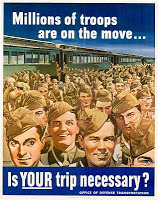 Sometimes historical research is dry, but often it brings up fascinating stories. While reading excerpts from 1945 issues of Time Magazine, a story grabbed my attention. It involved Antioch, California—the small (at the time) town I used as the hometown for the heroes in my novels. A bit of time over microfiche copies of the Antioch Ledger pulled the details together.
Sometimes historical research is dry, but often it brings up fascinating stories. While reading excerpts from 1945 issues of Time Magazine, a story grabbed my attention. It involved Antioch, California—the small (at the time) town I used as the hometown for the heroes in my novels. A bit of time over microfiche copies of the Antioch Ledger pulled the details together.Like many good stories, this involves an unlikely assortment of characters.
The President's Son and a Hollywood Actress
Col. Elliott Roosevelt, second son of President Franklin D. Roosevelt, served in the US Eighth Air Force based in England as a pilot and a commander of a reconnaissance wing. On December 3, 1944, he married glamorous film star Faye Emerson at the Grand Canyon. This was his third marriage.
A Small-Town Police Chief
In an entirely different world, Al LeRoy served as police chief in Antioch, California, population 7250. With his wife—also named Faye—he raised two stepsons and his son, Leon. At seventeen, Leon joined the US Navy and was assigned as a gunner on a tanker. Chief Al LeRoy was an upstanding member of the community—a World War I veteran and a member of multiple civic organizations. On December 6, 1944 he died of a sudden heart attack at age 44. At sea, his son Leon was unaware of his father's death.
A Dog Named Blaze
Back in England, Colonel Roosevelt bought a 130-pound bull mastiff named Blaze for his bride, and he had it shipped to her Hollywood home.
A Grieving Sailor
In January 1945, Seaman 1/C Leon LeRoy's ship docked in New York City. There he received a pile of letters—and he finally learned of his father's death. He received a furlough to go home and visit his mother.
During the war, the transportation system was strained by the competing needs of civilian and military transport. Military travel took priority, but even in the military, priorities were assigned. Seaman LeRoy had "C" priority.
Bumped by a Dog
On January 9, 1945, the C-47 transport plane carrying Seaman 1/C Leon LeRoy landed in Memphis, Tennessee. Cargo was loaded carrying an "A" priority label, meaning it was "required by an emergency so acute that precedence should be given over all other traffic." This crucial cargo was a large crate carrying Blaze the bull mastiff. To make room, Seaman LeRoy was bumped from the flight, along with a Seabee and Army T/Sgt. Dave Aks, home for the first time in thirty-one months to visit his critically ill wife in Riverside, California. LeRoy wouldn't arrive in Antioch until January 16, leaving him only three days to stay at home.
National Scandal
The Antioch Ledger published the story on January 16, 1945. It was picked up by the UP on January 17, and the story made the January 29 issue of Time Magazine. The public was incensed, and the US Senate formed a committee to investigate the matter. Colonel Roosevelt had been due to receive a promotion to brigadier general on January 17, but this was held up until January 22 during the investigation.
Colonel Roosevelt stated he had never requested top-priority transport for his dog, and his wife hadn't even known the dog was coming. Fingers were pointed, even to the president's daughter, Anna, for arranging the transport. In the end, it was most likely a low-level bureaucratic error.
Justice
Seaman LeRoy's furlough was extended an additional five days to January 27. In a nice twist, Lt. Harriet Ainsworth, a WAVE serving with the Naval Air Transport Service, arranged a priority flight for his return to New York City on January 26. .
Published on February 11, 2011 05:00
Today in World War II History
70 Years Ago—Feb. 11, 1941: President Roosevelt approves construction of the Alcan Highway to connect Alaska to Washington; will open October 30, 1942.
Published on February 11, 2011 03:00
February 10, 2011
Today in World War II History
70 Years Ago—Feb. 10, 1941: RAF Stirling bombers first used in combat—in bombing raid on Nazi-occupied Rotterdam in the Netherlands.
Published on February 10, 2011 03:00
February 9, 2011
Today in World War II History
70 Years Ago—Feb. 9, 1941: U-boats and Fw 200 Condor bombers sink 8 of 16 ships in British convoy HG53 off the Azores. In Libya, British advance halts at El Agheila.
Published on February 09, 2011 03:00
February 7, 2011
Make It Do - Coffee Rationing in World War II
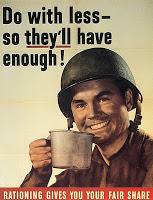 Rationing was an important part of life in the United States during World War II. Although not necessary for survival—though that's debatable—coffee has been a staple in the American diet since the Boston Tea Party, and coffee rationing was extremely unpopular.
Rationing was an important part of life in the United States during World War II. Although not necessary for survival—though that's debatable—coffee has been a staple in the American diet since the Boston Tea Party, and coffee rationing was extremely unpopular.Why Coffee?
During World War II, Latin America produced bumper crops of coffee beans, and those countries were Allies or neutral. However, the demands of the military on shipping required diversion from importing coffee. To make sure men in uniform received enough, civilians had to do with less.
Ration Books
In preparation for rationing, in October 1942, sales of coffee were halted to prevent hoarding. On November 29, 1942, rationing began. Americans had already received War Ration Book One in May 1942 for sugar rationing, so the Office of Price Administration merely adjusted the value of the stamps. Stamps #19-28 were each designated for one pound of coffee during a specified five-week period. When the period expired, so did the stamp. Coffee stamps could only be redeemed for family members over the age of fifteen.
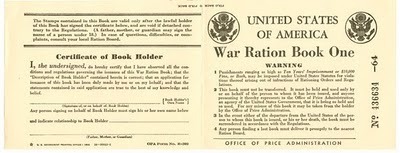
Making Do
One pound every five weeks produced less than one cup a day. While some coffee drinkers benefitted from the generosity of non-coffee drinking friends or family members, most made do with less. Reusing grounds made a watery beverage dubbed "Roosevelt coffee" in honor of the president. People found if they used a bit less and percolated longer, they could stretch their ration a bit further. Coffee substitutes such as chicory or Postum (wheat bran, wheat, molasses, and maltodextrin) were used grudgingly or mixed with real coffee. Another war victim was the familiar coffee can. Due to a shortage of tin, manufacturers packaged coffee in glass jars.
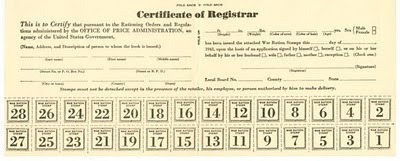
All Bad Things Come to an End
On July 28, 1943, President Roosevelt—who had patriotically switched his morning beverage from coffee to milk—announced the end of coffee rationing. Coffee was the first item to come off rationing. However, in September 1944, the Office of Price Administration raised the price of coffee to curtail demand—under the threat of a return to rationing.
What do you think? How would you get by on one cup a day?
Published on February 07, 2011 05:00
Today in World War II History
70 Years Ago—Feb. 7, 1941: In Libya, the British are victorious at Beda Fomm. 20,000 Italian POWs are taken.
Published on February 07, 2011 03:00
February 6, 2011
Today in World War II History
70 Years Ago—Feb. 6, 1941: In Libya, Australian troops take Benghazi.
Published on February 06, 2011 12:28
February 5, 2011
Today in World War II History
70 Years Ago—Feb. 5, 1941: Battle of Beda Fomm begins: British and Australian troops encircle bulk of Italian army in Libya.
Published on February 05, 2011 03:00
February 4, 2011
Too Late?
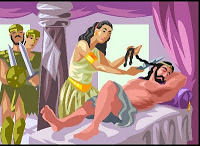
Ever feel like a loser? Like your bad habits have you in a stranglehold? Like your past gets in the way of your future?
Consider Samson. In Hebrews 11:32, he's numbered among the heroes of faith. His life contained acts of God-given physical strength to protect the Israelites from the Philistines. But his life was also a sordid drama of anger, lust, and weakness of will.
What sealed his place in the rank of biblical heroes was his death. Blinded, enslaved, humiliated, he prayed for one last burst of strength and received it. "He killed many more when he died than while he lived" (Judges 16:30).
We can learn a lot from Samson's example.
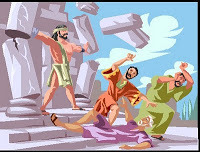
1) God can forgive any sin
Samson's acts of immorality loom large, especially his flippant attitude toward God's gift and the vows required to keep it. Yet in Samson's final moments, he was forgiven. Our sins can never outweigh God's forgiveness.
2) God can use the forgiven sinner
Samson's history did not make him useless to the Lord. When he prayed for strength, he received it, and God used him for one last mighty act. And see how the Lord redeemed his sin—his defeat placed him between those pillars right where God could use him. The Lord can use us too, no matter where our sin has placed us.
3) Even forgiven sin has consequences
Samson repented, but he bore the consequences of his sin—he did not regain his sight or freedom—and he died. We mustn't ever take sin lightly.
What do you take from Samson's example?
Published on February 04, 2011 05:00



